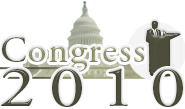Religion and the Secular State Discussed at International Conferences in Washington, D.C. – July – August 2010

Professor W. Cole Durham, Jr., Director of the International Center for Law and Religion Studies at Brigham Young University and Professor Javier Martinez-Torrón of the Law Faculty of Complutense University in Madrid and member of the ICLRS Academic Advisory Board participated in The XVIIIth International Congress of Comparative Law, held from July 25th through August 1st 2010 in Washington, D.C. The Congress, which is organized by the International Academy of Comparative Law, an 86-year-old organization of 333 members from more than 44 countries, is held once every four years in different parts of the world. The first Congress was held in 1932 in The Hague; this is the first year the Congress was held in the United States, where it was co-sponsored by the American Society of Comparative Law and hosted by American University Washington College of Law, George Washington University Law School, and Georgetown University Law Center.
Professors Martinez-Torrón and Durham acted as General Reporters for the topic “Religion and the Secular State,” making a presentation at the Congress in a Thursday-afternoon meeting chaired by Étienne Picard, University of Paris I. In preparation, they gathered and, with the assistance of staff and students associated with the ICLRS, prepared for publication the reports on the topic from National Reporters representing legal academics and other national experts from 50 countries. (See National Reports, below.)
On the occasion of the Congress, the International Center for Law and Religion Studies joined with the Interdisciplinary Program in Law and Religion Columbus School of Law, Catholic University of America, to sponsor a Comparative Perspectives Conference for the National Reporters on Religion and the Secular State and other interested guests, held at the Columbus School of law July 30-31. Topics addressed at the conference included The Autonomy of Religious Institutions, Limits on Legal Regulation of Religion, Financial Support of Religion, Religious Symbols in Public Space, Freedom of Religion, and Freedom of Expression and Offenses against Religion.